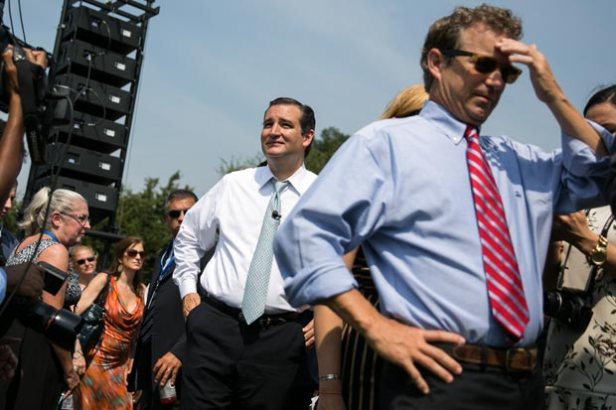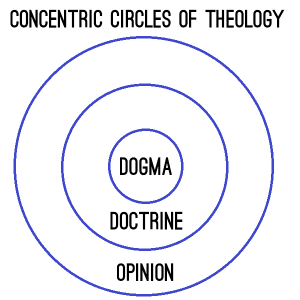So Rand Paul won the CPAC presidential straw poll for the second year in a row and pretty much every libertarian in America loves him, right?
Videos by Rare
Most do. But you might be surprised to learn that there are some diehard libertarians that still don’t consider Rand Paul libertarian enough, most of them believing he doesn’t measure up to his father.
But now, Ron Paul is retired from Congress and the liberty movement he inspired is bigger than ever. Instead of one candidate all libertarians like, they now have dozens of candidates asking for their support.
And these candidates aren’t perfect. While Rep. Justin Amash has been dubbed the “new Ron Paul,” most politicians claiming the liberty label really aren’t consistently pro-liberty.
Take GOP Senator Ted Cruz. A constitutionalist who drew wide support from top liberty movement organizations, he’s perhaps the best-known advocate of free-market healthcare. Cruz is a strong supporter of the Second Amendment, opposes the TSA and NDAA, and wants to let young people opt out of Social Security.
But Cruz also wants to keep fighting the failed war on drugs, ran on a platform of growing our already wasteful and bloated military, and took at best a tepid response to the NSA revelations.
So do libertarians vote for him or not?
 Senators Ted Cruz and Rand Paul
Senators Ted Cruz and Rand Paul
Or, on the Democratic side, there’s Senator Ron Wyden. He’s a staunch opponent of civil liberties abuses from the PATRIOT Act, the NSA, and internet regulations like SOPA and PIPA—all important issues. He even voted against the bank bailout and criticized the stimulus.
But Wyden also supports gun control, backed U.S. intervention in Libya, and voted against the Balanced Budget Amendment.
So is he pro-liberty or anti-liberty?
Or what about Senator Rand Paul? He opposes the PATRIOT Act, the NSA, the TSA, the NDAA, and obviously drone surveillance and drone warfare on noncombatants. He’s making realistic steps toward scaling down the drug war.
Rand is the only nationally-known Republican doing anything concrete to reach out to minorities and he’s doing it with a libertarian message. He’s fiscally conservative, fights the Fed, defends the Constitution, understands blowback, opposes foreign aid, and advocates privatizing marriage.
Heck, he even called the presidency “criminal,” paraphrasing Charles Pierce in Esquire to say that every “four years we elect a new criminal because that’s become the precise job description.”
That’s a fairly Ron Paul-level critique of the executive branch. Literally no other nationally-known, major-party politician would say that on record.
But, yes, Paul the younger also has supported keeping Gitmo open and has made some reckless statements about Iran.
So what do libertarians do with Rand Paul? He’s clearly not perfect, but on net balance, do libertarians deem him good—or bad?
Does he make the cut?
As the liberty movement matures and continues to have real influence, libertarians need a new way to make voting decisions. Most elections won’t feature the black and white choice of a Ron Paul v. Mitt Romney match; and as new candidates with varying credentials come on the scene, simple purity tests become increasingly unhelpful.
So what should we do instead? I propose we borrow an idea from theology.
If you know anything about church history, you know that Christians have literally spent thousands of years arguing. It’s against that backdrop that we’ve come to so value an old saying which you may recognize: “In essentials, unity. In non-essentials, liberty. In all things, charity.”
To visualize this advice, some theologians draw concentric circles of theology: In the center is dogma; in the middle ring, doctrines; in the outer ring, matters of opinion. So, for example, that Jesus is God is dogma—in other words, it’s a vital part of the Christian faith. That goes in the center.
A doctrinal issue would be something like free will v. predestination: It’s really important, but it’s not vital to the faith. Both Baptists (free will) and Presbyterians (predestination) are Christians. And in the outer circle of opinion are questions which can happily coexist in one church, like whether there are animals in heaven.
So how does this apply to politics?
Libertarians need a similar model to help decide which candidates they can support and which they can’t. Without these distinctions, it’s all too easy to reject a candidate who is wrong about an opinion-level issue even though he’s awesome on all “dogma” issues. Or libertarians might support a candidate who got a 90% on simple purity tests—but the 10% he got wrong was a “dogma” vital to liberty.
Concentric circles of politics give us a more dynamic rubric to help libertarians make logical, consistent voting choices without letting media spin, or—I’m gonna say it—the emotional fact that a candidate isn’t his dad get in the way.
So for libertarians who haven’t ordered their political opinions in a concentric circles model, your reason for hating Rand Paul pretty much (logically) sucks.
As the countdown to 2016 begins, get out some construction paper and figure out your circles. Some libertarians still may end up hating Rand Paul—but at least they’ll develop a consistent approach to Paul, Cruz, Wyden, and any other imperfect candidate who somehow manages to get libertarians on their email lists.




